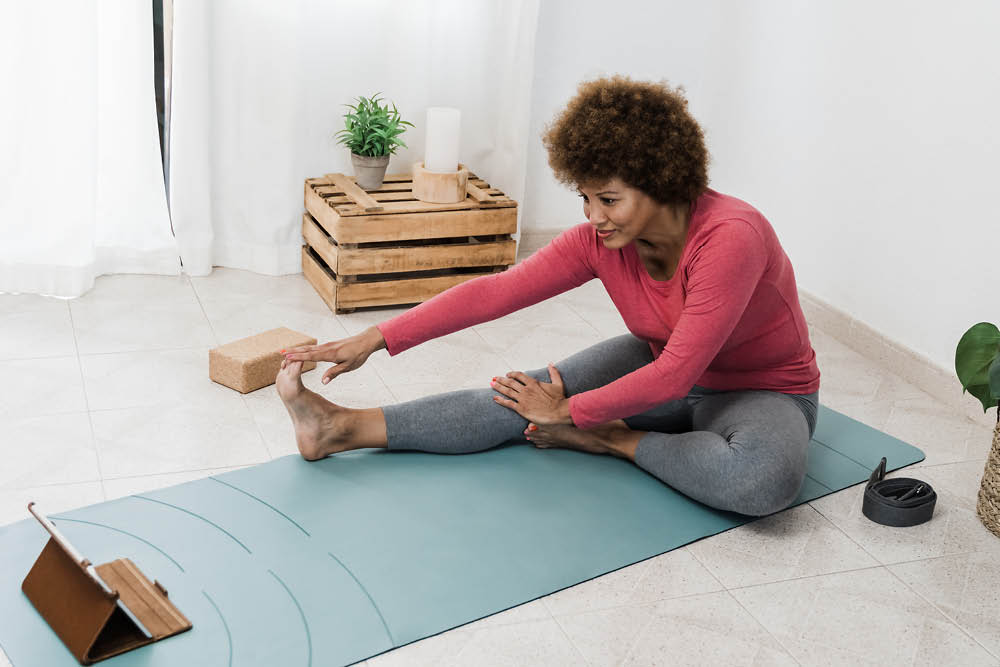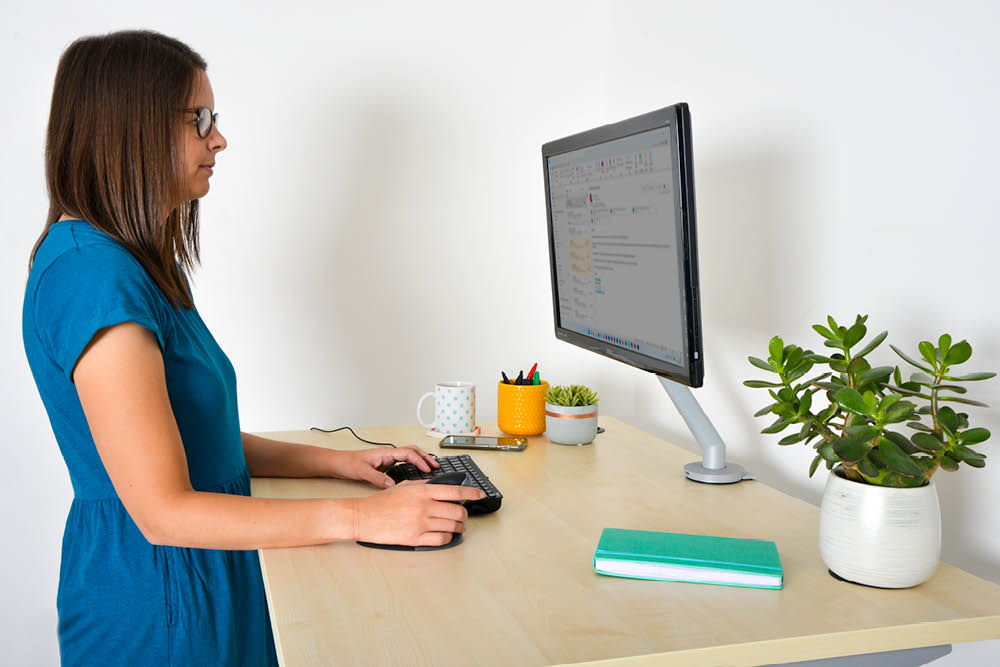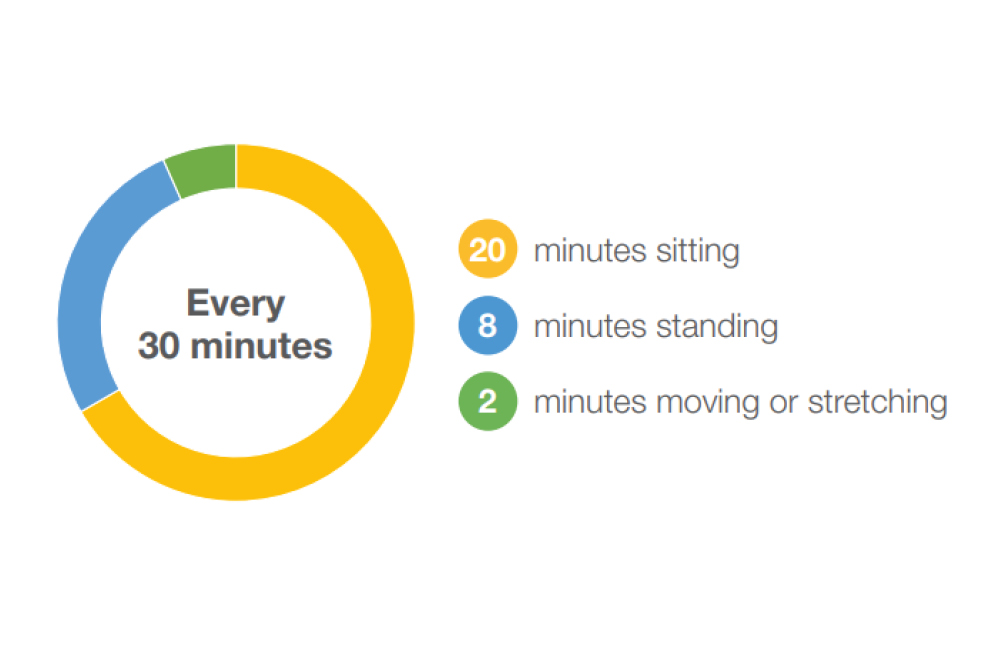
When it comes to workplace wellbeing, self-care is an essential part of maintaining a healthy balance between work and life. Whether you're working in an office or working from home, making time for self-care during your workday can be a challenge. But incorporating self-care into our daily routines can benefit our mental and physical health and help increase workplace productivity.
Which types of self-care are most beneficial when it comes to workplace wellbeing? We'll take a look in this blog. Self-care activities including:
- proper hydration and nutrition
- regular movement throughout the day
- positioning yourself correctly at your workstation
- managing stress levels
- and finding moments of relaxation
are all important aspects of looking after ourselves while on the job.

We'll also look at how we can incorporate simple acts of self-care into our workdays without sacrificing too much time away from our desks.
Finally, we'll discuss how employers can encourage employees to prioritise their own wellbeing to create healthier workplaces overall.
What does self-care mean in an office environment?
When it comes to workplace wellbeing, there are many types of self-care that can be beneficial for both physical and mental wellbeing. A few examples include taking regular breaks, staying hydrated and getting enough sleep.
Regular breaks throughout the day are an important way to avoid burnout and give yourself time to rejuvenate. Our brains and bodies need to flip between rest and stimulation to stay happy and energised!
Staying hydrated is also important, as dehydration can lead to headaches, tiredness and difficulty concentrating. Drinking 8 glasses of water a day or 2-3 litres is recommended if you are very active in the office environment.
Lastly, getting enough sleep is essential for both physical and mental health. Sleep deprivation can cause fatigue, making it hard to concentrate at work and negatively affecting motivation. It's recommended that adults get between 7-8 hours of sleep each night in order to stay alert during the day.
Aside from these basic self-care tips, you could boost your productivity by exercising regularly to move those muscles, eating healthy meals throughout the day and practising mindfulness activities such as meditation or yoga.

Exercise not only helps maintain physical fitness but has been shown to improve cognitive performance by increasing:
- attention span
- alertness
- productivity.
Eating healthy meals throughout the day at regular intervals helps us keep our energy levels stable so that we don't crash in the afternoon due to fatigue caused by not having proper nutrition. Here's a guide to making those working from home lunches as nutritious as possible.
Mindfulness activities such as meditation and yoga help reduce stress levels by allowing us to become aware of ourselves in any given moment so that we can respond rather than react when faced with difficult situations that arise at work or out of work-life balance issues. Find a yoga class near you via The British Wheel of Yoga charity, who promote a greater understanding of yoga and its safe practice through experience, education, study and training.
Have you tried using a sit-stand desk or sit-stand platform? New research is just out on their wellbeing benefits.
Self-care tips for the office environment
- Set a timer on your desk or phone to remind you to take regular breaks every hour. This will help ensure that you don't forget to give yourself time away from your desk throughout the day.
- Keep a bottle of water on your desk and make sure you drink regularly throughout the day, even if it's just small sips between tasks. Staying properly hydrated will help keep your mind alert and energised.
- Bring in a healthy snack such as nuts, fruit, or dark chocolate so that you can stay nourished.

- Take walks outside during lunchtime or when taking breaks – fresh air and natural light are great for re-energising and helping reset your body clock if you're feeling tired or sluggish in the afternoon.
- Reduce aches and pains and improve your posture and productivity by switching between moving, standing and sitting to work. So: break your day into 30-minute chunks. According to 'Hedge's 3s ideal work pattern' developed by Cornell University, in a 30 minute period you should sit for 20 minutes, stand for 8 minutes and stretch or move for 2 minutes. Enjoy the health and wellbeing benefits of using a sit-stand platform such as the Opløft to very easily change between sitting and standing at your desk.
How can employers encourage staff wellbeing?
Employers can encourage employees to prioritise their own wellbeing to create healthier workplaces in a variety of ways. One of the most important steps is to ensure that employees feel comfortable taking breaks and making time for self-care.

This means creating an office environment where workers are not afraid of judgement if they take a lunch break, or if they step away from their desks regularly during the day. This is for good health, and good health is good for business as well as for people.
Encouraging team members to use their annual leave days and allowing flexible hours are two other actions employers can take to promote employee wellbeing. Many people find it difficult to disconnect from work and therefore do not use their allotted holidays, leading to burnout and long-term stress.

Employers should also make sure they have reasonable expectations when it comes to out-of-hours contact.
Creating a workplace culture that emphasises physical activity is another way employers can help ensure employee wellbeing. This could involve providing access to gym membership discounts or offering incentives such as extra leave for completing certain fitness goals.

Look after your staff by embracing the principles of ergonomics. Provide all employees with information, support and suitable equipment – such as an ergonomic office chair – to create healthy and productive workspaces suitable for all their tasks.
Another way employers can encourage their staff's wellbeing is through emotional support systems. This may include regular check-ins with each individual employee, having an open dialogue about mental health issues, or providing access to counselling services.
Providing resources on topics such as nutrition, sleep hygiene and stress management can be incredibly useful in helping team members stay on top of their health and wellbeing while at work.
Summary
The importance of workplace wellbeing cannot be underestimated. Unhealthy working habits have been linked to an array of physical and mental health issues, from cardiovascular disease and obesity to anxiety and depression. With a quarter of people in the UK reporting that their job has negatively impacted their mental health, it's clear that we should be doing more to ensure we, and any employees we have, are practising self-care during work hours.
Blog by Millie Fuller
Read next:











